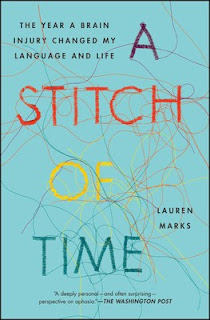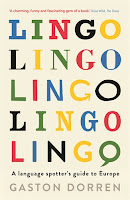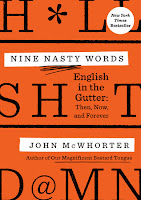I am an inveterate life-logger. At the end of a calendar year, I like to review what I've done, what I've liked, what I've been grateful for, etc. This includes reviewing the books I've read. This year I've had the thought: why not do the languagey bits of that on this blog? So here we are.
- I have to do so much reading at work, I can lose sight of reading as a leisure activity.
- I accidentally acquire a lot of books.
I'm going to start out with the best three books about language that I read in actual book form. Then I'll say something about two 2021 books that I read in manuscript and appreciated enough to provide a blurb for. Then I might tell you a bit about writing.
My best language reads of 2021
1. Memory Speaks: On Losing and Reclaiming Language and Self Julie Sedivy (Harvard UP, 2021)
Let's start at the end of my year, with the book I've just finished. Julie Sedivy's Memory Speaks: On Losing and Reclaiming Language and Self. Sedivy, a Czech-born and (mostly) Canada-raised linguist, uses her personal experience as the starting point for exploring the psychological, social, and emotional aspects of being multilingual and of losing one's childhood language to attrition (then recovering it).

The book is written with an empathy that never dumbs the subject down, but that constantly made (mostly monolingual) me think "I never thought of that. Of course it must feel that way." People who grew up with more than one language are likely to value the insights into the psychology of their multilingualism and the kinship across languages with other multilingual folk. But it's got to be even more valuable for those of us who grew up monolingual as part of a linguistic majority, letting us in on the meanings, consequences, and feelings of multilingualism and potentially complicating our views of what it means to know a language.
As I read Memory Speaks, I was surprised that it was a book from a university press. That probably means it's not going to be on as many bookshop or public library shelves as it should be. Please seek it out and read it. (I hope it's being translated into other languages. Especially Czech! I'm sure that would be an interesting challenge.)
Full disclosure: the publisher sent me a complimentary copy of this book.
2. A Stitch of Time: The Year a Brain Injury Changed my Brain and my Life by Lauren Marks (Simon and Schuster, 2017)
 The author was the subject of probably my favo(u)rite episode of The Allusionist podcast—which was how I learned about the book. Marks was 27 when a burst aneurysm deprived her of almost all language. The book tells the story of her linguistic (and personal) recovery—though perhaps rediscovery is a better word than recovery. The book is so well written that you might at times doubt that she still has aphasia (certainly, not to the same extent that she did at first), but then it might occur to you: perhaps her distance from English contributes to her vivid language, just as it contributes to her appreciation for its complexity and (related) silliness.
The author was the subject of probably my favo(u)rite episode of The Allusionist podcast—which was how I learned about the book. Marks was 27 when a burst aneurysm deprived her of almost all language. The book tells the story of her linguistic (and personal) recovery—though perhaps rediscovery is a better word than recovery. The book is so well written that you might at times doubt that she still has aphasia (certainly, not to the same extent that she did at first), but then it might occur to you: perhaps her distance from English contributes to her vivid language, just as it contributes to her appreciation for its complexity and (related) silliness.3. Lingo: A Language Spotter's Guide to Europe by Gaston Dorren (Profile Books, 2015)
Books I blurbed
I read manuscript versions of these very good books for which I was happy to provide a quote. I'm getting tuckered out at this point in this blog post, so I'm mostly just going to give the blurbs!
Nine Nasty Words: English in the Gutter: Then, Now and Forever by John McWhorter (Penguin, 2021)
“Call me old-fashioned, but goshdarnit this book has an
in-freaking-credible shipload of fizzy information. McWhorter’s delicate
linguistic ear is put to indelicate and delectable use in this deep
dive into the linguistic muck.”
McWhorter's book covers some classic 'swearwords' (I particularly enjoyed the demonstration of taboo words becoming pronouns), but also the N-word, whose taboo status is soundly demonstrated by the necessity to circumlocute it.

"Gareth Carrol gives us an expert's tour of the hotspots where popular culture meets etymology. A rich dive into the wheres, whys, and hows of linguistic memes."
You'd be surprised how deep the stories go for very recent idioms. Great research!
Enough about reading. What about writing?
The blog has been rather silent for much of the year. This little burst of writing (Two posts in one week! Another planned soon!) is courtesy of a holiday/vacation made much less social/busy by the Covid in the air.
My writing energies these days are concentrated on the aforementioned book about 'small words'. I decided to write it as a challenge to myself, which is either a very good or a very stupid reason to write a book. I am enjoying it (as much as one can enjoy the very painful process of writing), but it is going much more slowly than the last book, since it's not on a topic I'd been blogging about for years.
The other main thing I accomplished in 2021(besides being head of department in crisis time, teaching new and old modules, living in a building site, and having a family life) was acclimating to my new (voluntary) job of editing Dictionaries: The Journal of the Dictionary Society of North America and getting two issues into publication.
Because of all that I've done little other writing—but for a few commissions:
- For the Guardian in May, I wrote about "missing" vowels in a new brand name.
- I've written two pieces for emagazine (for A-level students) on how the and this/these/that/those affect descriptions of people—including things like why Donald Trump talked about the African-Americans and why people tweeting about Love Island would write things like that Chloe instead of just using the person's name. Subcription information is here.
- In autumn, I reviewed The Fran Lebowitz Reader for the Times Literary Supplement.
One big help in 2021 was the opportunity to supervise students in work-placement positions in our department (a way of dealing with work placements while many businesses were shut down). I'm grateful to Tess Blakeway, for her help with book-related fact-checking and editorial work, and Summer Raselma for largely taking over my Difference of the Day posts on Twitter for a few months.
So that's my year in reading and writing. I do hope this post might direct some readers to the excellent books I've mentioned!






